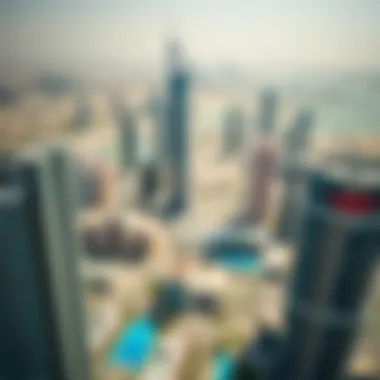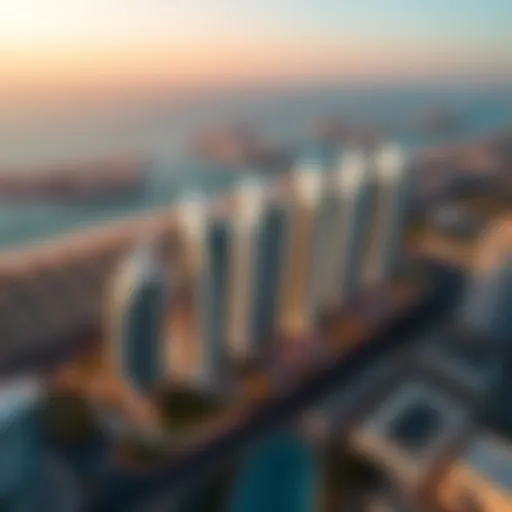Navigating Dubai's Real Estate Market for Home Hunters


Intro
Navigating the real estate scene in Dubai is like walking through a bustling bazaar, full of vibrant opportunities but also potential pitfalls. For those looking to buy or invest, the task can be daunting—especially if you're not familiar with the local market dynamics. There's a ton to grasp, from current trends and legal regulations to the variety of properties available. This article aims to strip away the complexities and lay out a practical guide to help home hunters, investors, and renters alike make informed choices in this dynamic landscape.
With a market that's as fast-paced as a desert wind, keeping an eye on trends is crucial. The following sections shine a light on current market analysis and what the future may hold. We'll take a good look at the types of properties that populate this thriving city as well. Specifically, we're going to dive deep into residential and commercial properties and the nuances that come with each.
By the end of this read, you’ll have a clearer understanding of what to expect in the Dubai real estate arena. So, whether you're contemplating buying your first home, seeking a profitable investment, or just exploring rental options, this guide aims to cover the bases you need.
Understanding the Dubai Real Estate Market
Understanding the intricacies of the Dubai real estate market is crucial for anyone looking to buy, sell, or invest in properties in this dynamic city. The market is not only a reflection of current economic conditions but also a harbinger of future trends and opportunities. For home hunters, grasping the local market landscape means being better prepared to navigate challenges, capitalize on emerging opportunities, and make informed decisions.
Market Overview
The Dubai real estate market is notable for its diversity and vibrancy. Spanning luxury villas by the coastline to modern high-rise apartments in the city center, the market caters to a broad spectrum of buyers and tenants. Property values fluctuate, influenced by various factors such as location, economic conditions, and infrastructure developments. Many foreign investors are particularly attracted to Dubai due to its tax-friendly policies and the regulatory framework that supports foreign ownership.
For example, prime areas like Downtown Dubai and Dubai Marina not only attract international buyers but also serve as good investment opportunities due to their high rental yields. In contrast, areas like Jumeirah Village Circle or Discovery Gardens may offer more affordable options but could still be appealing for those looking to enter the market with a lower budget.
Recent Trends and Predictions
Recent analysis shows a shift in buyer preferences, indicating an increasing demand for sustainable and smart technologies in housing. As more people look for energy-efficient homes, developers are responding by incorporating eco-friendly designs and smart-home solutions.
Predictions for the upcoming years suggest that residential property prices will stabilize after experiencing fluctuations in recent periods. Some real estate experts believe that the market will see an uptick in activity linked to major global events and developments, such as World Expo 2020, which is reshaping the city’s infrastructure and attraction.
Moreover, the rise of remote working is influencing demand patterns as buyers show greater interest in spacious homes outside the city center, where they can benefit from a quieter lifestyle while still being connected to urban amenities.
Economic Indicators Influencing the Market
To truly understand the Dubai real estate market, one must consider the economic indicators at play.
- GDP Growth: A steady GDP growth rate, often led by the tourism and service sectors, can push property prices and demand higher.
- Inflation Rates: Lower inflation often correlates with higher real estate investment since borrowing costs are more manageable for buyers and investors alike.
- Foreign Investment Levels: Increases in foreign direct investment signal confidence in the market, providing an influx of capital that can drive prices upward once demand increases.
"Understanding these indicators is like seeing the fulcrum on which the scale of property prices rests; ignore them, and you risk misjudging your moves."
Every home hunter or investor should keep a keen eye on these economic signals, as they can create windows of opportunity when well-timed actions can yield higher returns.
In summary, a thorough understanding of the Dubai real estate market provides strategic advantages that can lead to successful investments, whether it’s acquiring a family home, a rental property, or an investment in luxury real estate. The landscape is continually evolving, making it essential to stay informed about market conditions, trends, and the economic indicators that shape this vibrant real estate environment.
Types of Properties Available
In the bustling metropolis of Dubai, knowing the types of properties available can make or break a home hunter's experience. Each property type offers a different lifestyle and investment potential, appealing to varied tastes and preferences. Understanding what's out there not only helps in making informed decisions but also sheds light on the financial implications, design aesthetics, and community vibe associated with each type. Let’s dive into the distinct categories that form the backbone of Dubai’s real estate landscape.
Residential Properties
Residential properties are the bread and butter of the Dubai real estate market. They cater to families, singles, and expats alike, offering a range of options from villas to apartments and townhouses.
Villas
Villas are typically seen as the crème de la crème of residential living in Dubai. These stand-alone homes often come with yards and pools – a luxury that many families crave. With spacious designs, villas tend to promote a lifestyle steeped in comfort and privacy. One significant aspect of villas is their ability to provide a personalized touch; owners can tailor their homes to fit their unique styles.
However, the commitment to a villa can be daunting. Maintenance costs might add up, and there may be rules imposed by homeowners’ associations regarding alterations or landscaping. That said, for families looking for space and a secure neighborhood, villas often shine as a popular choice.


Apartments
Apartments represent the more urban alternative in Dubai’s residential sector. They're often located in high-rise buildings, affording residents stunning views of the landscape. This type of property appeals to singles or young couples, offering a more affordable entry point into the real estate market compared to villas.
Many apartments come with amenities such as gyms, pools, and concierge services, effectively creating a vibrant community feel. Nonetheless, the trade-off might be in terms of space and privacy, as shared walls with neighbors can limit both. It’s crucial for buyers to weigh lifestyle preferences against the advantages of apartment living.
Townhouses
Townhouses offer a delightful blend of villa space and apartment convenience. Often featuring multiple floors, they provide ample room while still fitting into a community-oriented setting. Townhouses cater well to families who appreciate a sense of belonging while maintaining their living space.
The uniqueness of townhouses lies in their architectural style; many mirror the features of a villa, yet are more compact. This can lead to lower maintenance costs, but potential buyers should keep in mind that communal living often equates to shared expenses and regulations, which can sometimes be less desirable.
Commercial Properties
As Dubai thrives, the demand for commercial properties is on an upward trajectory. These spaces are essential for accommodating businesses, from startups to multinational corporations.
Office Spaces
Office spaces in Dubai are a critical pillar of the commercial property landscape. Locations such as Dubai Marina or Downtown Dubai offer prestigious addresses, attracting high-profile firms. The allure of office spaces often hinges on their infrastructure capabilities, with many buildings boasting cutting-edge technology and amenities.
However, choosing the right office space may require a keen eye for detail. Rental costs can be astronomical, and the fluctuating market requires careful financial planning. A well-located office can elevate a brand’s presence, but it’s important for businesses to balance location against budget constraints.
Retail Units
Retail units serve as the face of commerce in the vibrant communities of Dubai. They can be anything from boutique shops to franchise outlets. The significance of these units grows as the tourism sector thrives, bringing foot traffic and potential sales.
The unique feature of retail units is their ability to adapt to changes in consumer behavior. With the rise of online shopping, many brick-and-mortar stores are now focusing on experiential marketing to attract customers. While being located in prime areas can be beneficial, it could also lead to increased rent, which demands further analysis from prospective business owners.
Industrial Sites
Industrial sites play an intrinsic role in supporting Dubai’s economy. These properties are designed to accommodate manufacturing, logistics, and warehousing needs. Given Dubai’s strategic geographic positioning, many companies look to set up operations here to leverage trade routes.
However, industrial sites come with their own sets of challenges, including zoning laws and higher establishment costs. They may not suit all investors, but for those with the right vision, they can present lucrative opportunities in the long run.
Luxury Homes
For those seeking opulence, Dubai's luxury homes stand unrivaled. From extravagant penthouses to beachfront villas, these properties don’t just offer shelter; they provide a lifestyle infused with elite experiences. Investing in luxury real estate is often viewed as the pinnacle of status, making it a spotlight in the Dubai market.
The allure of luxury homes extends beyond their breathtaking architecture and sumptuous interiors. Many come with exclusive amenities, such as private gyms or access to yacht clubs. Yet, potential buyers should be aware of the fluctuating nature of this segment and its dependence on foreign investment. Buyers must do their homework, considering market trends and potential resale value.
Investment Opportunities in Dubai
Investing in real estate in Dubai holds significant allure for both seasoned investors and those dipping their toes into the property market for the first time. The flourishing market provides a diverse array of investment opportunities ranging from residential to commercial properties. Understanding these avenues can be beneficial as home hunters navigate their way through Dubai's unique real estate landscape. Each option comes with its own set of risks and rewards, making it crucial to weigh these factors carefully.
Buying for Rental Income
Purchasing property specifically for rental income is a common strategy employed by investors looking to generate a steady cash flow. Dubai's real estate market, with its mix of expatriates and tourists, offers prime opportunities for landlords. Popular areas like Dubai Marina and Jumeirah Beach Residence often yield higher rental returns.
Key Benefits:
- Steady Demand: With an ever-growing population and a flood of tourists, rental properties tend to attract tenants easily.
- High Rental Yields: Often, investors can expect rental yields ranging from 5% to 8%, making real estate a lucrative investment compared to other asset classes.
- Flexible Leasing Options: Depending on the location, landlords have the option for short-term rentals via platforms like Airbnb, which can significantly increase earnings.


However, it's vital to consider factors like market saturation, property management responsibilities, and legal obligations related to tenants. Failing to understand the legal landscape could lead to disputes or financial loss.
Flipping Properties
The strategy of flipping properties—buying a property at a lower price, enhancing its value through renovations, and selling it for a profit—has garnered a lot of attention in Dubai. Investors looking to flip must have a keen sense for valuable locations and a understanding of renovation costs.
Considerations:
- Market Timing: Knowing when to buy and sell is crucial. The right moment can result in substantial profits, but misjudging can lead to losses.
- Location is Key: Properties in up-and-coming neighborhoods often hold the best flipping potential. Keeping an eye on transport developments, schools, and leisure facilities can guide decisions.
- Quality of Renovations: Investors should focus on improvements that add significant value, such as modern kitchen upgrades or landscaping.
Legalities of Purchasing Property in Dubai
Understanding the legal intricacies of property purchase in Dubai is paramount for any prospective buyer. This section dives into the foundational laws guiding property ownership in the city, the structured pathways for acquisition, essential documentation, and the importance of real estate agents. As Dubai continues to attract foreign investors, grasping these legal aspects can help home hunters navigate this vibrant market with confidence.
Understanding Ownership Laws
In Dubai, the ownership laws are a blend of unique regulations and opportunities. Primarily, the emirate differentiates between freehold and leasehold properties. Freehold properties enable foreign buyers to hold complete ownership of the property and land without time restrictions, while leasehold properties typically grant ownership rights for a specified period—generally up to 99 years.
Foreign investors have the green light to purchase in designated areas known as freehold zones. Some notable examples include Dubai Marina, Downtown Dubai, and Jumeirah Beach Residence. It's crucial to clarify zones before embarking on your property journey to avoid any surprises later. Understanding these laws not only equips buyers to make informed decisions but also helps to mitigate potential legal disputes down the road.
Navigating the Purchase Process
Purchasing property in Dubai can seem daunting, but a structured approach simplifies the journey. The steps typically include:
- Research: Start by identifying the type of property you wish to acquire—whether it's a villa, apartment, or commercial space. Research the neighborhoods that align with your lifestyle and investment goals.
- Agreement: Once you find a suitable property, an agreement, often called a Memorandum of Understanding (MoU), must be signed. This document outlines the terms of the sale, including price and payment schedule.
- Deposit: A deposit—usually around 10% of the total price—is placed to secure the property.
- Transfer: The next step involves transferring ownership through the Dubai Land Department. This includes paying the transfer fees, which can be about 4% of the property's value.
- Finalization: Upon successful transfer, you'll receive a title deed, serving as official proof of ownership.
These steps paint a clear picture of the purchase process, although personal circumstances and property types may necessitate minor adjustments.
Key Documents Required
Before you step into any property negotiation, having the right paperwork in place makes life a whole lot smoother. Below are essential documents you need to prepare:
- Passport: A copy of your passport serves as primary identification.
- Visa: A valid UAE residency visa is required for foreign buyers.
- No Objection Certificate (NOC): This certificate, issued by the developer, confirms that there are no outstanding dues related to the property.
- Marriage Certificate: If buying jointly with a spouse, it's good practice to have your marriage certificate.
- Utility Bills: Documenting your residency can sometimes enhance credibility.
These documents underpin the purchase process, acting as hedges against potential disputes and ensuring you're legally on the right side of the fence.
Working with Real Estate Agents
Engaging with a reputable real estate agent can be a game changer in your property-transacting journey. These professionals understand local market dynamics, legal nuances, and can offer guidance on rental yields or market trends. Furthermore, the right agent can facilitate the entire purchase process and help with negotiations.
When selecting an agent, consider:
- Credentials: Look for agents licensed by the Real Estate Regulatory Authority (RERA).
- Experience: A seasoned agent familiar with the Dubai market is invaluable. Their insights could save you time and money.
- Client Reviews: Checking testimonials or speaking to past clients can give you a sense of reliability and service quality.
Connecting with an experienced real estate agent can alleviate the stress of navigating the complexities of property acquisition in Dubai, ensuring you’re well-positioned to make informed decisions.
Remember: The Dubai real estate landscape is constantly evolving. Keeping abreast of legal changes and market trends will safeguard your investment and help you make sound decisions in a competitive environment.
Challenges Faced by Home Hunters
The Dubai real estate market, while undoubtedly alluring, brings with it a set of significant challenges for home hunters. Understanding these hurdles is crucial for potential buyers and investors to navigate the terrain effectively and make informed decisions. Among the challenges discussed here are market volatility, financing difficulties, and cultural considerations that any prospective buyer should keep in mind.


Market Volatility
The first obstacle relates to the idiosyncratic nature of market fluctuations in Dubai. Given its status as a global property hotspot, prices can swing wildly, driven by local and international economic conditions. For instance, high-profile events like the Expo 2020 and fluctuations in oil prices can impact demand and, subsequently, property values.
Home hunters must remain vigilant, equipped with awareness of current trends and historical data to anticipate potential shifts. In fact, asking questions like, "Is it a buyer’s or seller’s market right now?" can give the buyer insight into negotiations. It’s wise to consult reliable real estate platforms or local advisories to gauge recent activities. Being aware of market cycles may mean the difference between a lucrative investment and a costly misstep.
"Understanding market dynamics is not just an asset, but a necessity in Dubai’s unpredictable landscape."
Financing Difficulties
When it comes to financing, many home hunters face a mountain of requirements that can quickly overshadow their excitement. Lending practices in Dubai differ significantly from those in many Western markets. For expatriates, securing a mortgage can come with a host of complications, like higher down payments and stricter lending criteria imposed by banks.
For example, lenders might require a minimum of 20% down payment for off-plan properties. Recently, some institutions have also begun checking credit scores globally, complicating matters for many foreign buyers. It's imperative for prospective buyers to prepare thoroughly by examining their financial standing and possibly consulting with financial experts who understand the regional nuances. This groundwork may save time, effort, and potential disappointments in the long run.
Cultural Considerations in Property Acquisition
The cultural intricacies of Dubai’s real estate scene further compound the challenges faced. Having a grasp of local customs and practices can make or break a deal. For instance, negotiation styles in Dubai might differ substantially; while some cultures favor a blunt approach, others engage in a more roundabout, relationship-building negotiations. Understanding these subtleties can foster rapport with sellers and make the transaction smoother.
Additionally, local Emirate laws play a pivotal role in the property buying process. Certain restrictions exist concerning foreign ownership, depending on the property type and location. Before embarking on the purchase journey, home hunters should do their due diligence or engage experienced real estate agents who can elucidate these laws effectively.
In sum, while the challenges in Dubai’s real estate market are varied and complex, awareness and preparation can significantly reduce risks. Knowledge is truly power when it comes to securing a future home or investment in this dynamic landscape.
Future Outlook for Home Hunters
The future outlook for home hunters in Dubai is both promising and multifaceted. As potential buyers and investors look to make informed decisions in an evolving real estate landscape, understanding what lies ahead can be invaluable. With the city's vibrant economy and continuous advancements in technology and sustainability, home seekers can benefit enormously by staying updated on these trends and developments.
This section highlights several key aspects that are changing the tide for prospective homeowners, emphasizing emerging markets, technological advancements, and sustainability trends in property development. By doing so, we present a comprehensive view of how these factors will shape the future for home hunters.
Emerging Markets
Dubai's real estate market is constantly evolving, with notable emerging markets becoming hotspots for home hunters. Areas such as Dubai South, Dubai Creek Harbour, and portions of Sharjah are gaining traction due to their development initiatives and potential for significant price appreciation. These districts offer various property types at competitive prices, catering to different buyer segments.
Moreover, these emerging markets often provide unique amenities and facilities that appeal to families and young professionals alike.
- Dubai South: Home to the Dubai World Expo, this area is designed to foster business and innovation.
- Dubai Creek Harbour: Featuring stunning waterfront views, it aims to be a centerpiece of modern living.
- Sharjah: With affordability being its key selling point, it offers excellent value for families purchasing their first home.
By exploring these regions, home hunters can uncover favorable opportunities that might slip under the radar.
Technological Impact on Real Estate
The impact of technology on the real estate sector cannot be overstated. Advancements in digital tools and platforms are changing how people search for property, making the process faster, more efficient, and more transparent. Virtual tours and augmented reality experiences enable prospective buyers to view properties remotely, saving time and effort.
Furthermore, the integration of blockchain technology in property transactions ensures secure, streamlined processes, reducing potential fraud risks. Investors and buyers alike can benefit from:
- Data Analytics: This gives insights into property values, helping hunters make informed decisions based on real-time market conditions.
- Smart Home Technology: An increasing number of new properties are being built with smart devices that enhance convenience and security for residents.
- Drones for Property Viewing: Some developers use drone technology to gather aerial views of properties, providing a comprehensive perspective that traditional photography simply cannot achieve.
By leveraging these technological innovations, home hunters can find advantageous deals while navigating the real estate market with greater confidence.
Sustainability Trends in Property Development
A growing emphasis on sustainability in property development is remarkably influencing the Dubai real estate market. Homebuyers increasingly prioritize eco-friendly features, and this trend is reshaping new projects. Developments that incorporate green technologies and sustainable practices tend to not only attract demand but potentially increase in value.
Several elements of these sustainability trends include:
- Energy-efficient buildings: These reduce long-term costs for homeowners and diminish the environmental footprint.
- Water conservation systems: As water scarcity becomes a global issue, properties that utilize advanced systems for water management will appeal to many buyers.
- Community-centric designs: Developments that foster a sense of community, with parks, cycling paths, and public spaces are becoming more desirable.
These principles empower home hunters to make choices that align not just with personal preferences, but with a vision for a sustainable future.
In summary, the outlook for home hunters in Dubai is promising, energized by emerging markets, technological advances, and a commitment to sustainability. Keeping abreast of these trends provides an edge to buyers, ensuring they are equipped to navigate through the dynamic landscape effectively.











